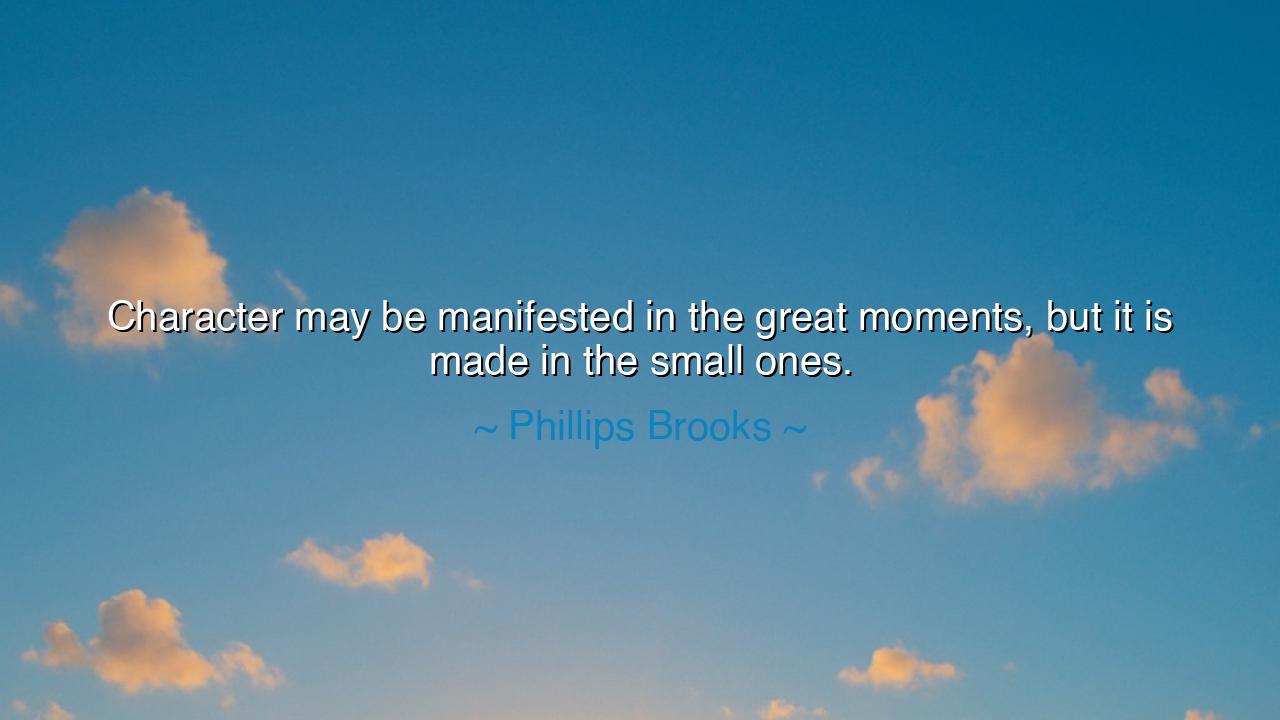
Character may be manifested in the great moments, but it is made






"Character may be manifested in the great moments, but it is made in the small ones." So spoke Phillips Brooks, a man of deep insight into the human soul. In this saying lies a truth older than empires, one whispered through the corridors of time: that the grandeur of a person is not forged in the thunder of applause, but in the quiet dawns and dusks of ordinary days. The great moments may reveal who we are to the world, but the small moments—those unseen by any eye but our own—are where we truly become who we are meant to be.
In the stillness of life’s humble hours, when no witness stands beside us, character is shaped. It is formed in the silence of decisions that seem trivial: whether to speak truth when it is easier to lie, whether to show kindness when no one will thank us, whether to labor faithfully when the reward seems distant. These small deeds, repeated daily, form the unseen foundation upon which greatness stands. For when the storm of destiny arrives, and the heart is tested by fire, it is the strength built in those hidden moments that sustains us.
Consider the story of Abraham Lincoln. Before he stood as the savior of a divided nation, before his words carved hope into the soul of America, he was but a humble lawyer walking dusty roads, known for his honesty and gentleness. In every small act—returning a few cents of overpaid change, staying late to aid a poor farmer with his case, speaking with patience to those who wronged him—his character was forged. When the crucible of the Civil War came upon him, he did not become great by chance; he merely revealed the greatness he had been shaping in the quiet years before.
So it is with all men and women of worth. The great moments do not make us—they merely unveil us. The soldier who stands fearless in battle first learned courage in the daily discipline of duty. The poet who stirs hearts with words first learned devotion in the lonely hours of practice. The mother who endures hardship for her children first cultivated love in countless small acts of care. The mighty oak does not spring forth in a single storm; it grows unseen beneath the soil, season after season, root upon patient root.
The ancients knew this well. The Greeks called it areté—excellence of soul, born of habit and moral striving. The Stoics spoke of virtue, not as a grand performance, but as a daily training of the heart. “We are what we repeatedly do,” said Aristotle. Thus, when the gods seemed to favor heroes with glory, it was not divine chance that made them noble, but the long practice of righteousness in the shadows before the light.
Let no one despise the small things, for they are the secret architects of destiny. The words you speak when no one listens, the work you do when no one sees, the kindness you show when no one thanks you—these are the stones that build your temple of character. One who neglects them cannot stand when the great trials come, for greatness without foundation is but a castle built on sand.
Therefore, my child—be faithful in the small moments. When you rise in the morning, greet the day with honesty. When you speak, let truth dwell in your tongue. When you labor, do it with a full heart. When you meet others, treat them with gentleness, even if the world does not. For in these small things, unseen and uncelebrated, you are shaping your destiny.
And when the great moment finally comes—when life calls upon you to stand, to speak, to act—you will not need to summon courage or virtue from the air. They will already dwell within you, built by your own quiet hand. Then the world shall see what the heavens already know: that true greatness is not granted in a moment of glory, but made in the small ones.






AAdministratorAdministrator
Welcome, honored guests. Please leave a comment, we will respond soon